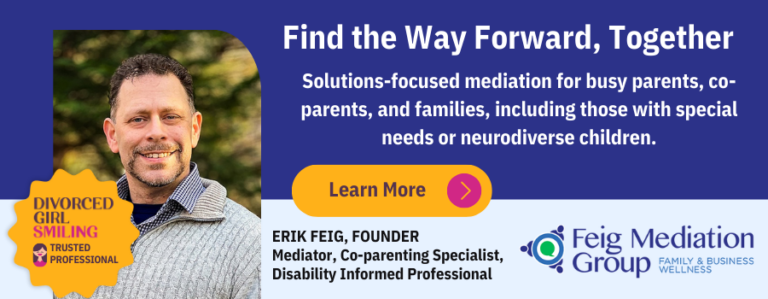How do you ask for forgiveness from someone you’ve hurt?
Something I see happen in many of my mediation sessions is one person attempting to apologize to the other. But there are many kinds of apologies. For instance, one type of apology can demonstrate a person is taking responsibility for their actions. At the same time, another may leave the recipient with the impression that the person apologizing is just going through the motions.
How you ask for forgiveness can often be as important as what you are apologizing for. In fact, it can also be the difference between an apology being accepted and not.
Let me start with what we learned in childhood.
From the time we’re young, we’re taught that taking responsibility for our actions is important. We learn it’s essential to recognize THAT and HOW our actions can impact- can hurt others- and that when that happens, an apology can be a crucial step in healing the hurt
.
“I’m sorry I broke your stuff.”
“I’m sorry I said something mean.”
“I’m sorry that what I did hurt you.”
Asking for forgiveness from someone you’ve hurt can be an important, powerful tool in healing relationships, re-establishing a connection, and moving forward from the past. Apologies are a rich subject that so much has been written and spoken about. But I want to focus on one crucial aspect of an apology that can make an enormous difference: three key words.
So what are they?
I’m, sorry, I.
It has become common to apologize using phrases like:
“I’m sorry you’re upset.”
“I’m sorry that upset you.”
“I’m sorry you feel that way.”
Do these examples convey the same messages as those in the first group above?
Asking for forgiveness from someone you hurt can be more effective when you shift the focus from “you” to “I.” This simple shift in language can have a profound impact on how your apology comes across and on how it is received.
Let’s break it down further. “I’m sorry” is an expression of regret. Following this with an “I” statement makes the connection between me (the person who’s done something) and what I’ve done with you, the person impacted by me and what I’ve done. It’s a recognition that I’m responsible and accountable for my actions and their impact on others. It affirms the connection between you and me and the harm of something that was in my control or that I set in motion.
Contrast that with what, in my opinion, we see too often: The “I’m sorry you” apology like those we listed above.
This form of apology starts off the same way with a statement of regret, “I’m sorry,” but then it turns the camera focus away from me onto you, the person who was on the receiving end of whatever it was the apology was supposed to address.
“I’m sorry you’re upset.”
“I’m sorry that bothered you.”
“I’m sorry you don’t understand.”
What do all of these have in common? They put the focus on “you” – and more specifically, on your reaction to what “I” did, rather than keep the focus on me and my responsibility for what I did.
Note what’s also missing in each statement: my accountability. Instead, you get a vague message about how I regret your reaction. How is that going to be heard? It’s as if you are saying:
“I’m sorry for your response (to what I did).”
See the difference? You may not personally be responsible for the other person’s feelings, but your words or actions evoked a reaction. They impacted someone else. That’s your part, and your piece of the interaction is what your apology can be part of healing.
“I am sorry for what I did” emphasizes keeping the “I” focus, which is so important. It speaks to your contribution and acknowledges that you are responsible for what’s in your control.
I appreciate that apologies can be difficult. There are so many personal, social, and relationship dynamics and factors that also influence us and our willingness to offer an apology. We also should acknowledge a vulnerability involved that could be difficult for some. I get that. I hope that understanding ways that your words can impact how you are heard can lead to more positive outcomes when you are asking forgiveness of someone you hurt.
What happens when you ask for forgiveness, and they don’t accept your apology?
This can be an all-too-common, complicated, and sometimes awkward situation, whether with your partner, family, friends or even in mediation. You’ve apologized. They don’t accept. Now what?
Responses to an unaccepted apology might look like this:
“You’re not sorry.”
“I don’t believe you.”
“You’re just saying that.”
You’ve done your part. Your apology was genuine. Now, from your perspective, it’s their turn to respond. Let’s look at the three basic possibilities: They accept it, reject it, or don’t give you an answer. For now, let’s focus on the first two of these options.
The first is the most straightforward: apology accepted. I’ll offer one thought to keep in mind: When you are willing and in a position to accept an apology, keep it simple:
“Thank you.”
“I appreciate it.”
“It means a lot to me.”
Then pause … give some space before you move on to anything else.
The more words you use, the more your acceptance gets cluttered with other stuff, the greater the chance that your acceptance – and its importance – can get lost. Once you accept an apology, move on. Find a way for you both to move forward.
What if your apology isn’t accepted? What if the reaction is something along the lines of:
“If you really meant to apologize, you would have …”
“You call that an apology?”
“I don’t believe you’re sorry.”
This can be a challenging, even jarring experience – especially if the rejection is coupled with criticism or some unhelpful comment that creates greater distance between you. If the other person is unwilling or not ready to receive your apology, you may hear responses like these.
This can be a tricky situation, and it’s not unusual that people in those moments would want to lash out in response – to give in to that temptation to want someone else to feel hurt too. In those moments, it can be challenging to understand or empathize with what’s driving their response.
It can take a great deal of effort and, for some, a degree of bravery to apologize – and when that effort feels discounted and rejected, your defense mechanisms may try to jump into action. Don’t underestimate the pull that this can create.
A suggestion: before you do anything in those moments, pause. Slow yourself down. Resist the temptation to respond in kind. Break the pattern.
What can this do for you? When you’ve offered an apology, you are asking for forgiveness. Recognize that you can only control your part in those situations in the interaction. You can’t control their response. You can’t demand that they feel how you hope they will feel.
Let me repeat that. You can only control your part. You can’t control their response. You can’t demand that they feel how you want them to feel. You can’t require forgiveness. You can only ask for it. You can set the stage. You can’t write their script.
Asking for forgiveness from someone you hurt, and for reconciliation is a process. They may not be at a point – yet – where they are open to really hearing or processing what you’re saying. They may not know how to move past the hurt THEY FEEL – and they might be caught up in their own cycle of conflict that is hard for them to break. It is possible that their response may not even be about you but about something going on with them.
It’s important in these moments to remember that all of that is on their side of the ledger. Feeling hurt is hard. Feeling rejected is hard – and I want to acknowledge that for people who struggle with rejection sensitivity, these moments pose a particular challenge.
Being able to pause in the moment and look beneath the surface to see what’s really going on can be hard to do – whether you are asking for forgiveness or being asked to grant it. But it’s a skill you can practice, and that’s worth practicing.
It’s important to recognize that sometimes, all you can do is your part. And to accept that whatever comes next, you’ve taken your step. It’s up to them to decide what theirs will be.

Erik M. Feig is a parent and family mediator located in Bethesda, Maryland who works with families nationally when they are navigating divorce, when they need help with issues post-divorce, particularly when neurodiversity and special needs are involved. If you’re considering mediation to help you with issues or conflicts that may be difficult to address on your own, or if you are interested in learning more about our practice, visit us at our website at www.feigmediationgroup.com to set up a free consultation.






















